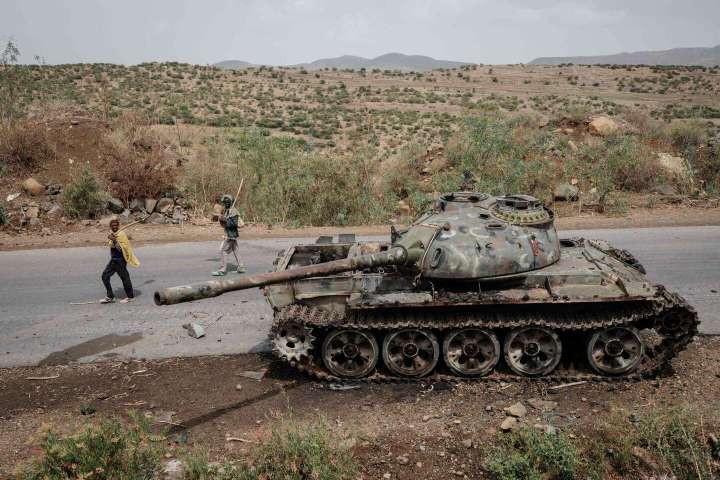Fighting erupted Wednesday near the Tigrayan border in Ethiopia, ending a months-long cease-fire and launching a new phase in a civil war that has had devastating humanitarian consequences.
Fighting erupts near Tigray border, dashing hopes of peace in Ethiopia

Ethiopia, which is Africa’s second-most-populous country and was long heralded as a beacon of stability in its region, has been ravaged for nearly two years by civil war. The government declared a humanitarian truce in March, allowing more aid to reach the northern region of Tigray, but the situation for civilians there remains dire. Thousands have been killed and millions displaced.
A report this month by the World Food Program found that nearly half of Tigray’s 5.5 million residents were in “severe” need of food, with malnutrition rates expected to increase until the October harvest. The number of people in need of food aid in Tigray and the neighboring regions of Afar and Amhara had increased 44 percent since January, the report said. Communication and banking services have been cut in Tigray for more than a year, and access for journalists has been restricted, making it difficult to assess the scale of the crisis.
Last week, Tedros Adhanom Ghebreyesus, the head of the World Health Organization, described the situation as “the worst disaster on Earth” and criticized world leaders for their silence about the conflict.
“I haven’t heard in the last few months any head of state talking about the Tigray situation anywhere in the developed world. Anywhere. Why?” asked Tedros, who is an ethnic Tigrayan.
“Maybe the reason is the color of the skin of the people in Tigray,” he said.
Ethiopia’s civil war began after Prime Minister Abiy Ahmed, a recipient of the Nobel Peace Prize, launched a military offensive against the TPLF, a regional political party that had ruled the country for three decades before the current government came to power in 2018. What began as a political power struggle increasingly became an armed ethnic conflict.
Last November, thousands of TPLF forces advanced to within 200 miles of Addis Ababa, the capital, prompting Abiy to say he would lead government forces from the front line. The rebels were pushed back in December and returned to Tigray.
The war has been marked by accusations of atrocities on both sides. A report by the United Nations last year found that both sides had “committed violations of international human rights, humanitarian and refugee law, some of which may amount to war crimes and crimes against humanity.”
In a statement Wednesday, the TPLF described the government’s military offensive as part of a “genocidal assault on the people of Tigray.”
“Tigray’s Army is reliably ready to repulse this offensive,” the statement said, “and transition into a counteroffensive to liberate occupied sovereign Tigrayan territory and return our displaced people to their homes.”
A government statement that followed accused the TPLF, which the government has labeled a “terrorist organization” — of ignoring attempts at establishing peace and launching an attack Wednesday morning near the towns of Bisober, Zobel, and Tekulesh.
“They have committed attacks and are crying out with the false propaganda that they have already mastered,” said the government statement. “As the Amharic proverb goes, ‘a lash whips itself and screams.’”






